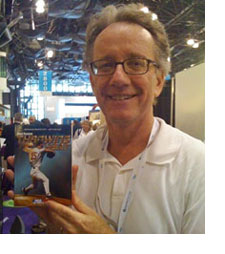
Fred Bowen knows about the power of sports and the power of story and so started writing novels when his own son was young. He shares real sports stories in a weekly feature in the Washington Post called The Score . Like his novels, the column focuses on sports but points to issues that go far beyond the playing field.
Bowen has written about football, basketball, and soccer but we’re in late summer and baseball season so I’ve concentrated on America’s favorite seasonal pastime in books by Fred Bowen.
Baseball is decidedly a team sport. You tackle experiences that are familiar to most young people like playing as a team. Teamwork is as difficult for young athletes as it is for their adult counterparts; jealousy and self-confidence may be factors. You deal with these themes in Dugout Rivals and Golden Glove . How did you tackle these topics?

The individual goals of each player may not always fit into the team’s goals. After all, every kid wants to be the star. That makes for a certain amount of tension and conflict. And that tension and conflict is always good for a story.
My son is a college baseball coach. We often discuss how the different players on the team come together or don’t come together during the season. These discussions have helped me with my stories.
Every team is different. Every season is a story. I think this is one of the reasons why fans enjoy following their favorite teams and why kids enjoy reading my books.
We all know what a perfect game is in baseball: no hits, runs, errors or walking the batter. But you take The Perfect Game in a very different direction. Tell us about it.
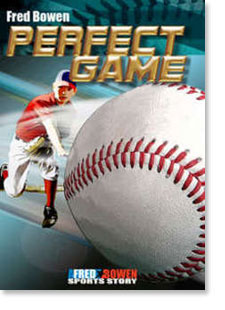
The basketball teams turn out to be a Special Olympics Unified Sports team. That is a team where kids with intellectual disabilities (ID) play as teammates with kids who do not have ID.
Being perfect is very difficult for the kids with ID (as it is for anyone). Still, the Special Olympic athletes can improve at their sport and have fun. So the experience of coaching and playing with the Special Olympics athletes forces Isaac to look differently at his desire to be perfect.
I wanted to write a book about perfectionism. I think many adults put a lot of pressure on kids to be perfect — to get “all As” and to never make any mistakes. That kind of pressure to be perfect can be very destructive.
By the way, it took me 13 years to write the book. I started the book Perfect Game, but then abandoned it because I did not know enough about kids with ID. Years later, I took up the project again. I spent many hours observing local Special Olympics Unified Sports teams, as well as talking to the Special Olympics coaches, kids and parents. This research made the characters richer and fuller and the book better.
You include a fair amount of history into your contemporary settings. Was the history the inspiration for Playoff Dreams and maybe even for Winners Take All ? Tell us about them.
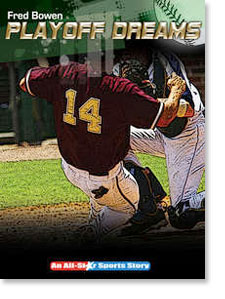
I thought this would be a great theme for a kids’ sports book — a story about a good player who is stuck on a bad team. That’s my book Playoff Dreams.
When I talk about Playoff Dreams during my school visits (I do a presentation about the writing process), I always ask the kids “who has ever been the best player on a bad team?” So many hands have gone up over the years that I have concluded there is an epidemic of kids who are great players who are stuck on bad teams!
In Winners Take All, a kid named Kyle fakes a catch to win a game. In other words, Kyle cheats.
The inspiration for that book came many years ago when I was watching a Red Sox game from Fenway Park on TV. The Boston right fielder was named Dwight Evans. During the game, Evans leaped up to catch what looked to be a certain home run. Evans tumbled over the right field fence and the ball popped out of his glove. Evans kicked the dirt and made it clear that he didn’t catch the ball. But the announcer on TV said, “If Dwight Evans was thinking right now, he’d hold up the ball.”
I kept that memory of that play in my mind until I started writing kids sports books.
All I did in Winners Take All was to have Kyle make the same play as Dwight Evans except in the book Kyle fakes the catch by holding up the ball. The book is really about honesty in sports and how far you would go to win a game.
How do you do the research for your books?
Many years ago, I was listening to my friend Valerie Tripp tell an audience about how she researches her wonderful American Girl books to make sure every detail is authentic.
I later confessed to Valerie that I felt like a fraud listening to the efforts she puts into researching her books.
“I don’t do that kind of research,” I confessed to her.
Valerie just smiled. “Fred, you have been researching your subject for your entire life,” she said.
And, in a sense, that’s true. I am a lifelong sports fan. I have been reading the sports section every day since I learned to read. I watch the games and events on television. I read Sports Illustrated and books about sports (a copy of The New Bill James Historical Baseball Abstract published in 2003 is on the reading table beside my bed). So I have been collecting sports stories for more than fifty years.
You seem to have a particular affinity for Ted Williams. Young coaches emulate him in a novel (Kid Coach ) and you’ve even written a fascinating biography of Ted Williams. What is it about Williams that intrigued you — or is it simply the New England connection?
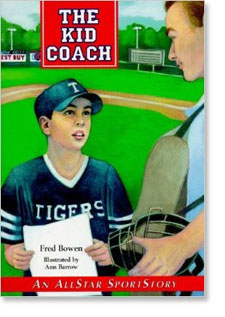
I never saw Ted Williams play. He retired in 1960, after hitting a home run in his last at bat in Fenway Park. After that, the man they called “the Splendid Splinter” and “Teddy Ballgame” drifted off into the mists of memory and legend. He was, after all, the last man to hit .400.
That was one of the stories you always heard. The one about how, back in 1941, Ted Williams was batting .400 and could have sat out the last two games of the season to preserve his .400 average. Even his manager encouraged him to sit.
But Ted Williams didn’t take the easy way out. He played the final two games and got more hits. He ended up batting .406 for the season.
Even as a kid, I knew there was magic in that story. The story said something every kid needed to hear about courage, doing the right thing and never taking the easy way out.
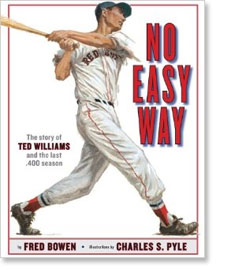
It seemed to me that a new generation of kids — a generation who are often praised for merely showing up — needed to hear the story of Ted Williams. They needed to hear how Ted Williams not only dreamed of being the greatest hitter ever but worked tirelessly to achieve it. They needed to hear how when he was presented with a difficult choice — the choice between whether to sit and to preserve his .400 season or to risk it all and play — Williams did not take the easy way.
That’s why I wrote the book, No Easy Way: The Story of Ted Williams and the Last .400 Season .
Your wife, Peggy Jackson, is a teacher. How does your interaction with her students as well as other young people influence your work?
Peggy has been an enormous help throughout my writing career. I think it is fair to say I would not be a writer but for her encouragement and persistence. I know I would not have accomplished half of what I have done without her help.
The fact that Peggy is a teacher is helpful because she come back with stories “from the front lines” almost every day. She also has a good sense of what kids are interested in and what they will understand.
Peggy reviews almost all of my books (she does not review my weekly Washington Post column — no marriage could stand that!). Peggy, however, is not a sports fan. But this is helpful because she has a very good sense of when I slip too much sports jargon into my books or when the details of the games might be difficult for a young reader.
Is there anything I haven’t asked that you’d like to address?
I would just like to say that all the writing I have done about kids sports — my 21 books and more than 750 columns — is aimed at getting kids and even their parents to think about what is really going on in the games kids play. Sports are enormously important in teaching kids about giving your best effort, teamwork and dealing with disappointment. Those life lessons are so much more important than the score of the game.
You can visit Fred at his official website . There you’ll find other books that Fred has written about basketball or football and soccer.
About the Author
Reading Rockets’ children’s literature expert, Maria Salvadore, brings you into her world as she explores the best ways to use kids’ books both inside — and outside — of the classroom.

